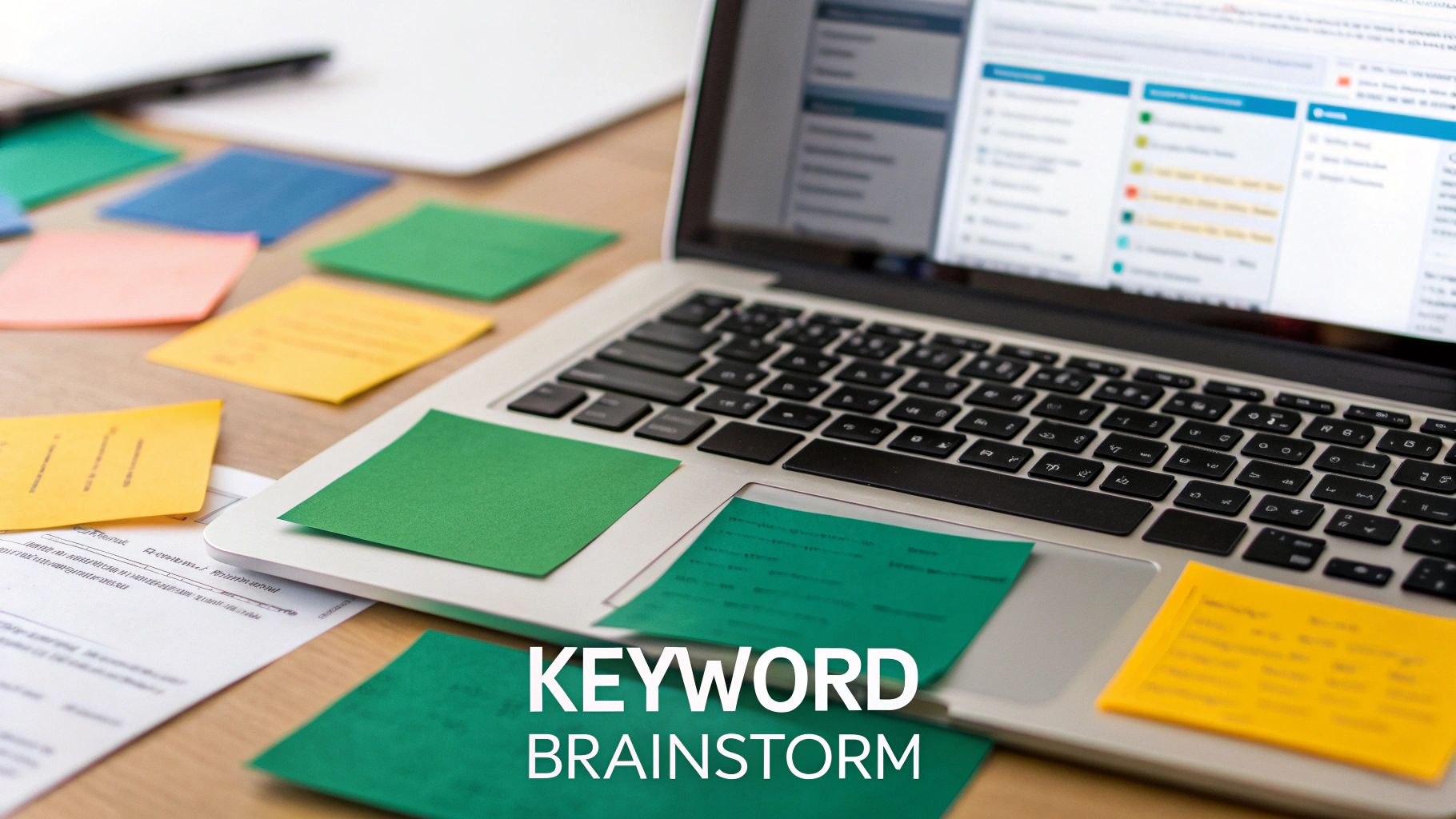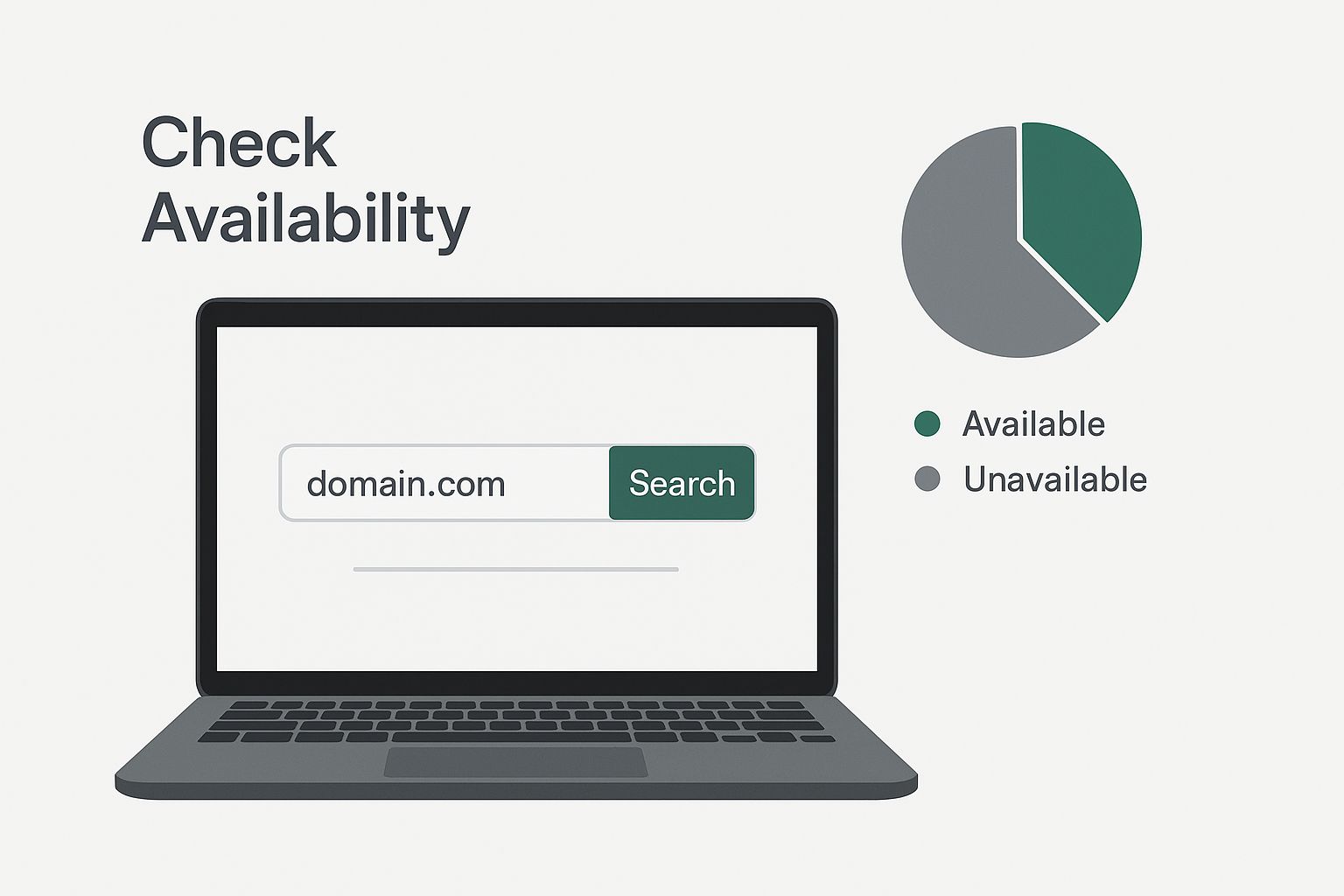How to Pick a Domain Name: A Small Business Guide
Learn how to pick a domain name that boosts your brand and attracts customers. Discover expert advice on choosing a memorable, SEO-friendly domain.
Picking the right domain name comes down to a simple formula: keep it short, make it brandable, and make sure it's easy to remember. For any Australian small business, finishing it with a trusted .com.au extension is the final, crucial step. This approach ensures local customers can find, remember, and trust you online, directly impacting your business's success.
Why Your Domain Is Your Digital Front Door

Think of your domain name as more than just a web address—it's the digital front door to your business. If you're a plumber in Ballarat or run a cafe in Cairns, it's often the first handshake you have with a potential customer. It’s what they’ll type into Google, tell a friend about, or see on the side of your work vehicle. A strong, professional domain is a fundamental asset that works for your business 24/7, making you look credible and helping you stand out from local competitors.
A good domain name directly affects your online success. It builds instant credibility, makes your marketing more effective, and helps your brand stick in a customer's mind. A clunky or confusing domain can make you look amateur, sending potential clients to a competitor down the road before they’ve even seen what you offer.
Building Trust and Local Authority
For a small or local business, trust is everything. Your domain name is a powerful tool for building it. A clean, relevant name like baysideelectrical.com.au immediately suggests you’re a professional and established local expert.
This is especially true for Australian businesses, where the .com.au extension is king, making up roughly 74% of all registered domains. Aussies instinctively trust it because they know it requires an ABN/ACN for registration, confirming they're dealing with a legitimate local business. This trust translates directly into more clicks and more customers. You can find more insights about Australian domain statistics to see just how dominant this extension is.
Your domain name is a critical business asset. It’s not just a technical requirement; it's a branding tool, a marketing channel, and a signal of trust all rolled into one.
A well-chosen domain can give you a real advantage in local search results, helping customers in your area find you first. Think of it as securing the best address on your town's digital main street—it's the foundation of your online success.
Finding a Name That’s Memorable and Brandable

Now for the practical part—finding a name that customers will actually remember. The best domain name is one you can say over the phone without having to spell it out. For a small business, this word-of-mouth-friendliness is non-negotiable.
Your own business name is the most logical starting point. If you’re known as “Coastal Carpentry,” then coastalcarpentry.com.au is a no-brainer. It's direct, it’s recognisable, and it reinforces the brand you're already building in your community.
But what if your business name is long or already taken? This is where you can get strategic. For a local business, adding your location or service is a powerful move. For instance, a plumber in Melbourne who specialises in emergency call-outs could go for something like melbourne247plumbing.com.au. That name instantly tells a potential customer what you do, where you are, and why they should call you.
Keep It Short and Simple
A great domain name always passes the "radio test." If a customer heard it on the local radio, could they remember it and type it in correctly later? This is a fantastic rule of thumb for any local business owner.
Here are a few actionable principles to follow:
- Make it easy to spell. Avoid clever misspellings like "xpress" for "express" or "kwick" for "quick." They just cause confusion and make you harder to find online. Stick to common words so customers don’t get lost.
- Keep it short. Aim for a name under 15 characters. A domain like
perthproplumbing.com.auis much easier to type on a mobile phone than a longer, more complicated alternative. - Avoid hyphens and numbers. Hyphens are easily forgotten. And numbers create confusion. Is
top5gardens.com.authe numeral '5' or the word 'five'? That ambiguity can lose you a customer.
A simple, brandable name is an asset. It makes your marketing easier, fuels word-of-mouth referrals, and gives your business a professional polish right from the start.
Once you’ve put together a shortlist of strong contenders, you can start thinking about building the actual website. You can find some excellent, practical advice by checking out the top website builders for small business, which will help you turn that perfect domain into a real, customer-generating machine.
Choosing the Right Extension to Build Local Trust
The bit at the end of your web address—the extension—does more heavy lifting than you might think, especially for a local business. It's a massive trust signal that immediately tells customers who you are and where you’re based. Getting this right is crucial for connecting with your local market.
For businesses that operate and serve customers in Australia, the .com.au extension is the gold standard. It’s a clear signal that you’re a legitimate local operation because you need an ABN or ACN to register one. This verification gives customers confidence, making them more likely to click on your website in search results and ultimately do business with you.
When to Look Beyond .com.au
While .com.au is the best choice for nearly all local businesses, there are a few specific scenarios where other extensions make sense.
- Going Global with .com: If you sell products online and have ambitions to expand internationally, securing the
.comversion of your name is a smart move. It's the most recognized extension globally. - Hyper-Local with .sydney or .melbourne: Newer, city-specific extensions can double down on your local identity. A name like
bondiplumbing.sydneyorfitzroycafe.melbourneleaves no doubt about where you operate, which is fantastic for targeted local marketing. - Specific Use Cases like .net.au or .org.au: These are niche.
.net.auis typically for network infrastructure companies, and.org.auis reserved for non-profit organisations. Unless you fit these specific categories, stick to.com.auto avoid confusing customers.
This kind of search is the first step in a surprisingly competitive process.

Globally, you're competing against over 371.7 million registered domain names. Seeing those numbers really drives home why a unique name and the right local extension are so crucial for standing out. You can explore more global domain trends to get a feel for just how crowded the internet is.
To help you weigh your options, here’s a quick comparison tailored for Australian small businesses.
Domain Extension Comparison for Aussie Businesses
| Extension | Best For | Local SEO Impact | Trust Factor (AU) |
|---|---|---|---|
| .com.au | Aussie businesses targeting local customers. | High. Signals to Google you're AU-based. | Very High. Requires an ABN/ACN, seen as the most legitimate. |
| .com | Businesses with international expansion plans or a global audience. | Neutral. Doesn't specifically target Australia. | Medium. Widely known, but lacks the local verification of .com.au. |
| .sydney / .melbourne | Hyper-local businesses wanting to strongly associate with their city. | High. Excellent for city-specific search terms. | Medium-High. Modern and clearly local, but less traditional. |
| .net.au | Tech companies, ISPs, and network providers. | Low. Not intended for general business or e-commerce. | Low (for non-tech). Can confuse customers looking for a standard business. |
For the vast majority of Aussie small businesses, the choice is clear: start with .com.au. It gives you instant credibility and gives your local SEO a real boost, helping you connect with the customers right in your own backyard.
Checking Availability and Steering Clear of Legal Trouble
You've landed on a few great name ideas—short, memorable, and perfect for your brand. But before you get business cards printed, you must ensure the name is actually available and legally safe to use. This isn't just about checking if the .com.au is free; it’s about protecting your business from future headaches.
First, do a simple domain availability check. This is the quick way to see if another business has already registered the domain you want.
Just pop "domain name checker Australia" into Google, and you'll find plenty of tools from domain registrars. The results page will look something like this:
These tools will tell you in seconds if your ideal name is taken and suggest alternatives, usually with different extensions.
Securing a Name That’s Truly Yours
Finding an available domain is a great first step, but it’s only half the battle. The last thing a small business owner needs is a "cease and desist" letter because their name infringes on a registered trademark. This is a common and costly mistake that can force you to rebrand your entire business.
Before you buy, perform these two essential checks:
- Trademark Search: Go to the official IP Australia search tool. Check that your chosen name isn't already a registered trademark in your industry.
- Business Name Search: Next, check the ASIC business name register. Even if it isn’t trademarked, an existing business with a similar name can cause massive brand confusion for your customers.
Don’t skip these legal checks. A few minutes of due diligence now can genuinely save you thousands of dollars and a world of stress later. It’s about building your brand on solid ground.
Once you’ve confirmed the name is available and legally clear, you're ready to register it. Taking these extra steps is fundamental to building your business authority online, which is a key part of our guide on how to rank higher on Google search.
How to Secure and Manage Your New Domain
So, you've landed on the perfect name. Fantastic! Now it's time to make it official by registering it through a domain registrar. Think of this as more than just a quick purchase; you're choosing a partner who will look after a vital piece of your small business's identity.
The first thing to look at is pricing. Be wary of registrars that offer a cheap first-year deal only to charge excessive renewal fees later. Look for transparent, long-term pricing so you can budget effectively without surprises.
Why Good Domain Management Matters
Beyond the price, a few features are non-negotiable for a small business. Domain privacy protection is one. Without it, your personal contact details (name, address, phone number) are listed in a public database, making you a target for spammers. Good customer support is another must-have – when technical issues arise, you need to know you can get help quickly to get your site back online.
A clean, easy-to-use management dashboard will save you countless headaches. This is where you'll manage renewals, connect your domain to your website hosting, and set up professional email addresses like [email protected]. A clunky interface can make these essential tasks a frustrating chore.
This isn't just a minor detail. The need for reliable domain management is growing, with predictions that Australia's managed domain name system market will expand by 20.2% between 2025 and 2030. This shows more businesses are realising the importance of security and professional management. You can read more on these managed DNS market projections if you're interested.
Choosing the right registrar is as important as choosing the right name. You're not just buying a domain; you're investing in the security and future-proofing of your online presence.
This purchase is one of the first and most important investments for your online presence. If you're mapping out your budget, our guide on how much a website will cost will give you a clearer picture of the overall costs.
Your Domain Name Questions, Answered
When you’re trying to lock in the perfect domain for your small business, a few questions always come up. Here are straightforward answers to help you make a confident choice.
Should I Use Hyphens or Numbers?
My advice is almost always a firm no. When your first-choice domain is taken, it's tempting to add a hyphen or number, but this usually creates more problems than it solves for a local business.
Imagine telling a potential customer your website is bobs-plumbing-247.com.au. They'll wonder if it's the number 247 or spelled out two-four-seven. They will forget the hyphen, mistype the address, and end up on an error page—or worse, a competitor's site. For word-of-mouth referrals and marketing, simplicity is key. Stick to letters only.
What If My Perfect Domain Name Is Already Taken?
It happens all the time. You come up with a brilliant name, only to find someone else got there first. Don’t worry—this is an opportunity to be more strategic and local.
For a small business, the best solution is to add a location modifier. If proplumbing.com.au is gone, try proplumbingperth.com.au or proplumbingsydney.com.au. This not only solves the availability problem but also boosts your local SEO by telling Google exactly where you operate. It's a win-win for findability.
Another common question I get is about how long to register a domain for.
For how long should I register my domain? I always recommend locking it in for at least two to three years from the get-go. Registering for a longer term sends a subtle signal to search engines that you're a legitimate business planning to stick around. Plus, it means less hassle for you and no risk of forgetting a yearly renewal and losing your domain by accident.
Getting these small decisions right from the start turns your domain name from a simple web address into a real business asset—one that helps customers find you and builds trust in your brand.
Ready to turn that perfect domain name into a customer-generating website? At SiteStarter, we build high-quality websites for tradies and small businesses, handling all the technical stuff so you can focus on what you do best. Get found on Google and attract more customers without the headache. Learn more at https://sitestarter.co.